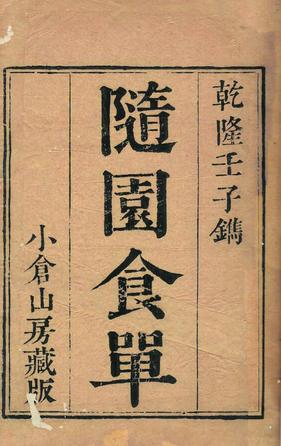
Cover of Yuán Méi’s Work on Food, 1792 Printing
Content created: 2020-11-03
File last modified:

Easily the best known collection of ghostly and supernatural tales in China today comes from the hand of Pú Sōnglíng 蒲松龄 (1640-1715).
But if there is a second famous author of ghostly tales, it is probably a certain YUÁN Méi 袁枚 (1716-1797), whose remarkable collection of over seven hundred stories and notes, Things the Master Didn’t Discuss (Zǐ Bù Yǔ 子不语) is mostly related to spirits and ghosts.
Yuán Méi 袁枚 passed the highest (jìnshì 进士) civil service exam at the young age of 23 and had a successful career as a magistrate in several locations, retiring from officialdom at the age of only 32 to devote himself to literary and artistic pursuits. He was famed in his own era as a poet, artist, scholar, and even as a travel writer and food critic! He was also apparently considered a scandalous libertine.

His collection of writings about food, “Suíyuán Shídān” 随园食单 was issued in a bilingual version as “Recipes from the Garden of Contentment: Yuan Mei’s Manual of Gastronomy,” translated by Sean Chen (Berkshire Publishing Group in 2018).
A continuing interest of Yuán’s was religion and the supernatural. Literary critics see the influence of Buddhism in his writings (although he apparently scorned institutionalized religion), and he seems to have amused himself collecting tales of supernatural occurrences and ghostly apparitions. These are what make up Things the Master Didn’t Discuss. “The master,” of course, is Confucius, who famously dismissed discussion of supernaturalism as a waste of time. The title Things the Master Didn’t Discuss derives from a passage in the Analects (Book VII, Chapter 20): “The master did not discuss extraordinary things, feats of strength, disorder, or spiritual beings” (Zǐ bù yǔ guài, lì, luàn, shén 子不语怪力乱神), and presumably the flamboyant Yuán Méi gave in to the temptation, perhaps a bit puckishly, to fill in for the great man.
Things the Master Didn’t Discuss was probably completed towards the end of his life, and seems to have circulated quite widely throughout the nineteenth and early twentieth centuries, although individual tales no doubt circulated by themselves as well, both as extracts and in retellings. For one thing, ghost stories would obviously be pre-adaptive to that. For another, it is not clear whether Yuán compiled or authored the tales, and some, perhaps many or most, may have had a life of their own long before he recorded them.
Things the Master Didn’t Discuss was sometimes printed with the title Xīn Qíxié 新齐谐, or New Book of Wonders, a reference to a much earlier Chronicle of Wonders (Qíxié Jì 齐谐记) by a certain SÒNG Dōngyáng 宋东阳, possibly dating to the early 500s AD. Sòng’s work is long lost, and there is no way to know today how similar Yuán’s collection may have been to it. Possibly Yuán believed he was carrying on with new material in Sòng’s same general style and spirit, or possibly the work represents only a slight expansion of Sòng’s original. We will never know.
Most of the Yuán’s tales on this web site are about jiāngshī 殭尸 —“zombies and vampires.” If some of Yuán’s stories were indeed taken from Sòng Dōngyáng, belief in such mosters may therefore be very ancient indeed, even though it has simply not been possible to trace it.
Yuán Méi also went by the given name (zì) of Zǐcái 子才 and by the fashionably poetic and vaguely Daoist nick names (hào) of Jiǎnzhāi 简斋 (“simple cottage”) and Súiyuán Lǎorén 随园老人 (“the Old Man in the Garden of Contentment,” probably an allusion to his gastronomy work). J.J.M. DeGroot, whose translations are used on this web site, consistently names him simply Suíyuán 随园.